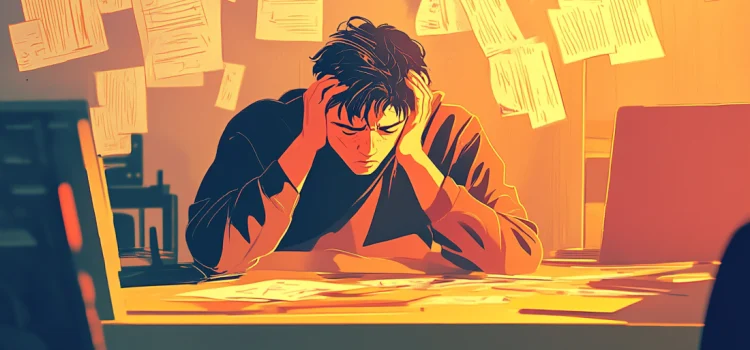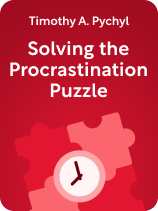

This article is an excerpt from the Shortform book guide to "Solving the Procrastination Puzzle" by Timothy A. Pychyl. Shortform has the world's best summaries and analyses of books you should be reading.
Like this article? Sign up for a free trial here.
How do your emotions cause you to procrastinate? What happens when you avoid negative emotions, rather than confront them?
Timothy A. Pychyl says that procrastination results from a failure of the cognitive capacity psychologists call emotion regulation. This is the ability to manage your emotions, attention, and behavior so you can work toward your goals or act according to your values.
Continue reading to learn why procrastination and emotional regulation are more commonly related than you might think.
Procrastination Is About Emotional Regulation
Procrastination is a choice to postpone a task you need to complete, even though you know that negative consequences will follow. Pychyl explains that when you choose to procrastinate, you deliberately make a decision that sabotages your progress toward your goals. But your knowledge that there will be consequences doesn’t make the habit any easier to overcome. That’s because procrastination isn’t rational: Instead, it’s driven by emotions.
Pychyl contends that procrastination is specifically a failure of emotional regulation. Procrastination happens because you want to feel positive emotions, and you achieve that by avoiding tasks that make you feel negative emotions about your work or yourself.
| How Do Emotions Lead to Procrastination? If procrastination is an emotion regulation problem, then you could find a way to keep your emotions from affecting your thought processes and just stop procrastinating, right? Not so fast: Research suggests feeling and thinking are actually inseparable processes, and you can’t keep one from affecting the other. In Feeling and Knowing, neuroscientist Antonio Damasio argues that your consciousness and sense of self don’t come from the “thinking” part of your brain. Instead, they arise from the feelings you experience when your nervous system—which your brain is just one part of—reacts to what you perceive. Damasio explains emotions, feelings, and thoughts as distinct but interconnected. Emotions are physiological responses to what you experience. For example, if you feel apprehensive about a task, you feel your heart rate go up or your palms sweat. Feelings are your mental interpretations of your emotions: what you describe as, for example, “anxiety.” Your thoughts are a conscious response to your feelings, and they can provoke emotions or feelings, too. Damasio contends your emotions have as big a role as your thoughts in your decisions. While you can think that you should really get a particular task done—and know, rationally, there will be consequences if you don’t—it’s hard to get started if your emotions tell you to stay away. |
We associate all kinds of negative emotions with the tasks we procrastinate on. For example, you might put off reading a proposal at work because you anticipate being bored by it. Or you might delay assembling the desk your partner asked you to build because you’re worried you’ll struggle with the instructions—being defeated by an Ikea desk would be pretty humiliating. (Shortform note: While Pychyl states that many different emotions can cause procrastination, philosopher Alain de Botton contends that it always comes down to a single emotion: fear. He explains that we often fear doing something badly, and we only overcome our procrastination when it starts to seem scarier to do nothing than to do the task badly.)
By avoiding negative emotions, we get to feel better temporarily. However, as Pychyl points out, we typically feel bad about procrastinating, so we don’t get to opt out of negative emotions altogether. Nonetheless, we choose to “feel good” for the moment by both avoiding an unpleasant task and imagining ourselves accomplishing that task some other time—like “later” or “tomorrow.” The problem is that this doesn’t happen just once: Procrastination becomes a habit, one prompted by the thoughts or feelings we associate with a task. (Shortform note: Experts say feeling bad about procrastinating can start a downward spiral: If you feel guilty about it, then your guilt can cause you to procrastinate more, which just leads to more guilt.)
(Shortform note: Other experts agree with Pychyl that you can quickly make procrastination a habit. Psychiatrist and Unwinding Anxiety author Judson Brewer says your brain does this via a habit loop of a trigger, a behavior, and a reward. The task is a trigger that prompts the behavior of putting the task off, which is then rewarded when you get a reprieve from the negative emotions you associate with the task, as Pychyl also points out. Brewer says one way to end these habit loops is to practice mindfulness: By paying attention to how procrastination makes you feel—anxious, guilty, or overwhelmed—you can learn to be curious about the thoughts and feelings that cause you to put things off, rather than disengage from them by procrastinating.)

———End of Preview———
Like what you just read? Read the rest of the world's best book summary and analysis of Timothy A. Pychyl's "Solving the Procrastination Puzzle" at Shortform.
Here's what you'll find in our full Solving the Procrastination Puzzle summary:
- The real reason why you procrastinate
- How procrastination undermines your ability to live a happy, healthy life
- Practical advice for changing your relationship with your most dreaded tasks






